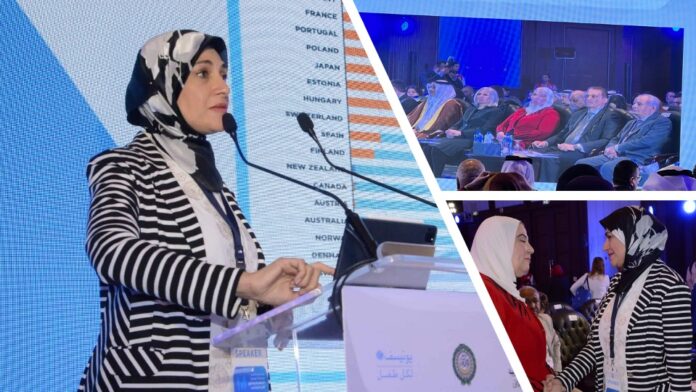In partnership with the League of Arab States and the United Nations Children’s Fund (UNICEF), the Egyptian Ministry for Social Solidarity arranged the first regional Arab Social Care Reform Conference. , held in Cairo from 26-17 February 2023. This was the first regional conference specific to developing social welfare policies and achieving social security in the Arab region. The conference was held under the auspices of Egyptian President Abdel Fattah El-Sisi and Social Solidarity Minister Nevine el-Kabbaj. The conference was well attended by several Arab Ministers and representatives, including from Lebanon, the Kingdom of Saudi Arabia, Oman, Kuwait, Libya and Palestine.
The MENARAH Network’s Founding Director, Professor Shereen Hussein, was invited to provide the opening keynote speech on the first day of the conference. On the second day, she led a session focused on developing the social care workforce. In her opening keynote speech, Professor Hussein presented an overview of the region’s social care and social security needs and discussed international and regional policy design, funding and implementation developments. In addition, she addressed the care trilemma of coverage, funding and the balance of provision between the state and family, providing examples of how different European countries have approached such a trilemma. Furthermore, she highlighted the importance of designing and implementing care services in an integrated manner to ensure the best outcomes for individuals and systems.
Professor Hussein concluded with recommendations for countries in the region to develop their vision and strategies to ensure the social well-being of different population groups. Professor Hussein’s keynote emphasised the different philosophies and approaches to empowering individuals and communities. She highlighted the unique opportunities in the region associated with the population dividends and the culture embracing community cohesion and responsibilities towards vulnerable individuals.
Read Professor Hussein’s Keynote speech titled: ‘Social Care Systems: Approaches, Models & Applications’.
SHussein-KeyNote-SCsystems-allOn the second day, Professor Hussein discussed the importance of developing care markets. This includes setting strong regulation and quality assurance standards for services and workforce training and development. She emphasised the wide range of roles and activities observed among the social services workforce providing case studies from Europe and Latin America. For education and training, Professor Hussein discussed the importance of practice placement and involving individuals who draw on social services in the selection process of the workforce, students and during the training phase. She explained that this is one of the tested ways of closing the gap between theory and practice when training social workers and other social services professionals. During her presentation, she discussed some implications of the COVID-19 pandemic and emerging needs among the workforce and those using the services, including potential positive outcomes such as innovations in service delivery through technology and community-based activities. Finally, she highlighted the region’s specific opportunities and challenges when developing its social services workforce.
Read Professor Hussein’s presentation on the workforce. Titled: ‘Overview of Social Services Workforce Activities & Regulation in Europe With Examples from Latin America’.
SHussein-workforceThe conference was well reported in the media (both in English and Arabic), including the official Egyptian State media, Watan News, Akhbar Alyom, and Alyom al-sab’i.
Founder and Director
Shereen Husseinis a Health and Social Care Policy professor at the London School of Hygiene and Tropical Medicine (LSHTM), United Kingdom.
Shereen Founded the MENARAH Network in 2019, through an initial grant from the Global Challenge Research Fund, UKRI. She is a medical demographer with expertise in ageing, family dynamics, migration and long-term care systems. Shereen regularly collaborates with the United Nations, the World Health Organisation and the World Bank in policy and research focused on ageing in the Middle East and North Africa Region.
Shereen received her undergraduate degree in statistics and a postgraduate degree in computer science at Cairo University. She completed an MSc in medical demography at the London School of Hygiene and a PhD in quantitative demography and population studies at the London School of Economics and Political Science, United Kingdom.



